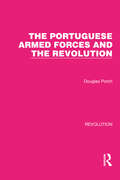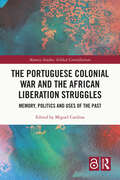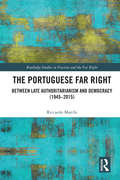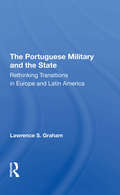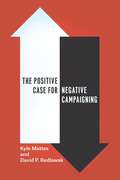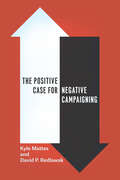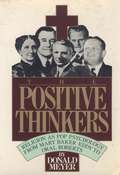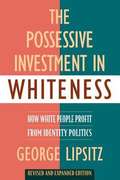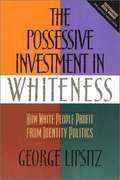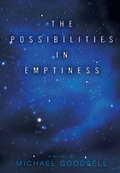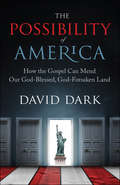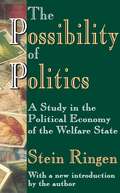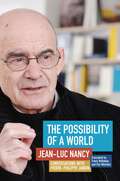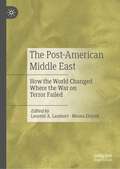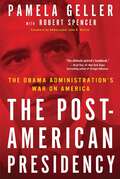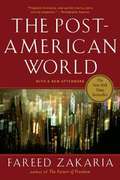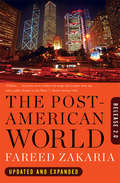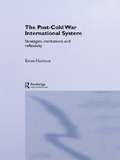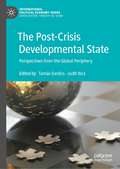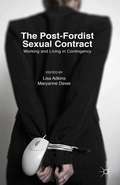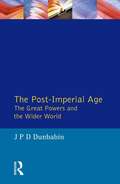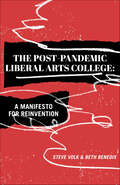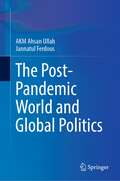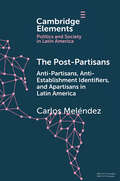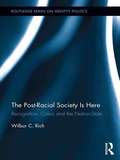- Table View
- List View
The Portuguese Armed Forces and the Revolution (Routledge Library Editions: Revolution #23)
by Douglas PorchThis book, first published in 1977, traces the origins of the left-wing Portuguese army rebellion of 1974 that overthrew the 50-year-old authoritarian regime of Prime Ministers Salazar and Caetano to the traditional political independence of the armed forces, their increasingly strained relations with the regime, and finally to the colonial wars which brought professional discontent to boiling point. The Portuguese revolution which followed provides a unique laboratory for the study of an army in crisis, the strains which the attempt by officers to direct the political life of the country after April 1974 placed on military organisation; the traditional career patterns and attitudes of soldiers and on discipline. It examines the role of officers in government and the day-to-day problems which political upheaval created in every barracks. This is a study both of the armed forces in politics and politics in the armed forces, placed within the larger context of the revolution.
The Portuguese Colonial War and the African Liberation Struggles: Memory, Politics and Uses of the Past (Memory Studies: Global Constellations)
by Miguel CardinaThe Portuguese Colonial War and the African Liberation Struggles: Memory, Politics and Uses of the Past presents a critical and comparative analysis on the memory of the colonial and liberation wars that led to a regime change in Portugal and to the independence of five new African countries: Angola, Mozambique, Guinea-Bissau, Cape Verde and São Tomé and Príncipe. Covering more than six decades and based on original archival research, critical analysis of sources and interviews, the book offers a plural account of the public memorialization of this contested past in Portugal and in former colonized territories in Africa, focusing on diachronic and synchronic processes of mnemonic production. This innovative exercise highlights the changing and crossed nature of political memories and social representations through time, emphasizing three modes of mnemonic intersections: the intersection of distinct historical times; the intersection between multiple products and practices of memory; and the intersection connecting the different countries and national histories. The Portuguese Colonial War and the African Liberation Struggles: Memory, Politics and Uses of the Past is the major and final output of the research developed by CROME – Crossed Memories, Politics of Silence, a project funded by a Starting Grant (715593) from the European Research Council (ERC). The book advances current knowledge on Portugal and Africa and deepens ongoing conceptual and epistemological discussions regarding the relationship between social and individual memories, the dialectics between memory, power and silence, and the uses and representations of the past in postcolonial states and societies.
The Portuguese Far Right: Between Late Authoritarianism and Democracy (1945-2015) (Routledge Studies in Fascism and the Far Right)
by Riccardo MarchiThe book discusses the far right in the contemporary Portugal (1945-2015) within three different periods: the end of the authoritarian regime of António de Oliveira Salazar (1945-1974), the transition to democracy after the coup d’état of April 25th (1974-1982) and the democratic regime until the present (1982-2015). The analysis focuses on political groups and parties, social movements, ideologies, intellectuals and publications acting at the extreme right of the political spectrum of the Portuguese authoritarian regime and of the democratic regime, both on a national and international level. The book also contextualizes the Portuguese far right within the political thought and the organisational models of the wider European extreme right. A qualitative in-depth case study and the outcome of ten years of research, this book offers analysis of historical and contemporary primary sources, previously unexplored archives and in-depth interviews. Assessing the extent to which the behaviour of the far right is altered in different political environments and situations, this book makes an innovative and unique contribution to scholarship on the extreme right within southern Europe and will be of interest to students and scholars researching extreme right politics, as well as European history and politics more generally.
The Portuguese Military And The State: Rethinking Transitions In Europe And Latin America
by Lawrence S GrahamLawrence S. Graham focuses on the implications of the Portuguese case for understanding more fully broader, cross-national patterns in politics and governance, showing how the Portuguese case may constitute an alternative model especially for Latin America and Eastern Europe.
The Positive Case for Negative Campaigning
by Kyle Mattes David P. RedlawskTurn on the television or sign in to social media during election season and chances are you’ll see plenty of negative campaigning. For decades, conventional wisdom has held that Americans hate negativity in political advertising, and some have even argued that its pervasiveness in recent seasons has helped to drive down voter turnout. Arguing against this commonly held view, Kyle Mattes and David P. Redlawsk show not only that some negativity is accepted by voters as part of the political process, but that negative advertising is necessary to convey valuable information that would not otherwise be revealed. The most comprehensive treatment of negative campaigning to date, The Positive Case for Negative Campaigning uses models, surveys, and experiments to show that much of the seeming dislike of negative campaigning can be explained by the way survey questions have been worded. By failing to distinguish between baseless and credible attacks, surveys fail to capture differences in voters’ receptivity. Voters’ responses, the authors argue, vary greatly and can be better explained by the content and believability of the ads than by whether the ads are negative. Mattes and Redlawsk continue on to establish how voters make use of negative information and why it is necessary. Many voters are politically naïve and unlikely to make inferences about candidates’ positions or traits, so the ability of candidates to go on the attack and focus explicitly on information that would not otherwise be available is crucial to voter education.
The Positive Case for Negative Campaigning
by Kyle Mattes David P. RedlawskTurn on the television or sign in to social media during election season and chances are you’ll see plenty of negative campaigning. For decades, conventional wisdom has held that Americans hate negativity in political advertising, and some have even argued that its pervasiveness in recent seasons has helped to drive down voter turnout. Arguing against this commonly held view, Kyle Mattes and David P. Redlawsk show not only that some negativity is accepted by voters as part of the political process, but that negative advertising is necessary to convey valuable information that would not otherwise be revealed. The most comprehensive treatment of negative campaigning to date, The Positive Case for Negative Campaigning uses models, surveys, and experiments to show that much of the seeming dislike of negative campaigning can be explained by the way survey questions have been worded. By failing to distinguish between baseless and credible attacks, surveys fail to capture differences in voters’ receptivity. Voters’ responses, the authors argue, vary greatly and can be better explained by the content and believability of the ads than by whether the ads are negative. Mattes and Redlawsk continue on to establish how voters make use of negative information and why it is necessary. Many voters are politically naïve and unlikely to make inferences about candidates’ positions or traits, so the ability of candidates to go on the attack and focus explicitly on information that would not otherwise be available is crucial to voter education.
The Positive Thinkers
by Donald MeyerThe subject of Professor Meyer's superb study concerns the dissolution of the Protestant ethic, its relationship to a general failure of nerve within the American community, and the consequent rise of a pseudo-theology in the guise of a pseudo-psychology, as reflected through the work of certain "mind-cure" practitioners, from Mary Baker Eddy to Norman Vincent Peale. It is a subject largely ignored by intellectuals, and Professor Meyer, in taking it out of the domain of the Reader's Digestor similar habitations, has produced a real service, not only to sociology and political science, disciplines in which he is very well versed, but also to mass-culture and the vague but insidious ethos behind it. In describing what the sub-title states as "the American Quest for Health, Wealth, and Personal Power," Professor Meyer works from an historical perspective, does not beat any drums nor ride any hobby horse; scholarly care and an in-depth generosity illuminate a number of intricate concepts, whether they be "individualism," laissez-faire industry or the peculiar role and influence of women within society. His work is schematized yet fluid, showing how a process of ego-disintegration has paradoxically resulted out of the improperly understood religious orientation of the past and the anxiety-ridden religious revival of the present. Today God "means" Adjustment.--Virgina Kirkus, Kirkus Reviews
The Possessive Investment in Whiteness: How White People Profit from Identity Politics, Revised and Expanded Edition
by George LipsitzIn this unflinching look at white supremacy, George Lipsitz argues that racism is a matter of interests as well as attitudes, a problem of property as well as pigment. Above and beyond personal prejudice, whiteness is a structured advantage that produces unfair gains and unearned rewards for whites while imposing impediments to asset accumulation, employment, housing, and health care for minorities. Reaching beyond the black/white binary, Lipsitz shows how whiteness works in respect to Asian Americans, Latinos, and Native Americans. Lipsitz delineates the weaknesses embedded in civil rights laws, the racial dimensions of economic restructuring and deindustrialization, and the effects of environmental racism, job discrimination and school segregation. He also analyzes the centrality of whiteness to U. S. culture, and perhaps most importantly, he identifies the sustained and perceptive critique of white privilege embedded in the radical black tradition. This revised and expanded edition also includes an essay about the impact of Hurricane Katrina on working class Blacks in New Orleans, whose perpetual struggle for dignity and self determination has been obscured by the city's image as a tourist party town.
The Possessive Investment in Whiteness: How Whites Profit from Identity Politics
by George LipsitzHard-hitting expose of American systemic societal racism.
The Possibilities in Emptiness: A meditation on the mystery of existence in a universe reluctant to unfold itself
by Michael GoodsellA despairing protagonist on a quest for his inheritance. An alluring artist. Twin Japanese hostesses. A mad mathematician driving a kombi, and an old potter schooled in Zen, are part of the cast of characters in an adventure of the spirit; its hopes, dreams and desires. The Possibilities in Emptiness, is a book for all people. It takes you on a young man's battle against conscription and the Vietnam war, in 1970. And into the mysterious contradiction which is Japan, in the late 1980's. Miles Tracy is on a mission to find Shigeo Kitani...and anything to fill the void. If you like Bob Dylan, Che Guevara, Kurt Vonnegut, Zen, Sushi, and a search for meaning; then read on...
The Possibility of America: How The Gospel Can Mend Our God-blessed, God-forsaken Land
by David DarkPublished in the years following 9/11, David Dark’s book The Gospel according to America warned American Christianity about the false worship that conflates love of country with love of God. It delved deeply into the political divide that had gripped the country and the cultural captivity into which so many American churches had fallen. <P><P> In our current political season, the problems Dark identified have blossomed. The assessment he brought to these problems and the creative resources for resisting them are now more important than ever. Into this new political landscape and expanding on the analysis of The Gospel according to America, Dark offers The Possibility of America: How the Gospel Can Mend Our God-Blessed, God-Forsaken Land. Dark expands his vision of a fractured yet redeemable American Christianity, bringing his signature mix of theological, cultural, and political analysis to white supremacy, evangelical surrender, and other problems of the Trump era.
The Possibility of Politics: A Study in the Political Economy of the Welfare State
by Stein RingenThe Possibility of Politics explores the power of political reform, specifically reform of the modern welfare state. Can reform be effective if limited to cautious and piecemeal interventions that avoid radicalism and revolution? Can it also avoid unwanted consequences? Will the welfare state survive in the future?Stein Ringen views the welfare state as a large-scale experiment in political reform. To ask if the welfare state works is to ask if political reform is possible at all. By its nature, the welfare state is reform on a grand scale, for it attempts to change the circumstances individuals and families live under without changing and disrupting society itself. But is it realistic to believe a population can get together, set goals and then try to meet these goals through collective actions, specifically public policies, without causing unintended consequences and destroying the state in the process? The welfare state attempts, idealistically, to redistribute welfare without reshaping the economic processes that cause inequities in the first place. Ringen considers how well redistribution has met the test in terms of political legitimacy, its intended effects on poverty and inequality, as well as its undesired and unintended effects on economic efficiency and the quality of private life. Ultimately, does the welfare state work? Further, is the welfare state a good thing?In considering these questions, The Possibility of Politics should be of particular value to academics and advanced students interested in political theory, public economics, social administration, and political sociology.Stein Ringen is professor of sociology and social policy at Oxford University and a Fellow of Green College. He teaches social and political theory and research methodology for graduates in social policy, sociology, politics, economic and social history and other subjects.
The Possibility of a World: Conversations with Pierre-Philippe Jandin
by Jean-Luc Nancy Pierre-Philippe JandinIn this series of interviews, Jean-Luc Nancy reviews his life’s work. But like Schlegel’s historian—“a prophet facing backwards”—Nancy takes this opportunity to rummage through the history of art, philosophy, religion, and politics in search of new possibilities that remain to be thought.This journey through Nancy’s thought is interspersed with accounts of places and events and deeply personal details. The result is at once unpretentious and encyclopedic: Concepts are described with remarkable nuance and specificity, but in a language that comes close to that of everyday life.As Nancy surveys his work, he thinks anew about democracy, community, jouissance, love, Christianity, and the arts. In the end, this is a book about the possibility of a world—a world that must be greeted because it is, as Nancy says, already here.
The Post-American Middle East: How the World Changed Where the War on Terror Failed
by Moosa Elayah Laurent A. LambertAfter two decades of War on Terror, it is particularly important, for both academic and policy purposes, to clearly understand why the US formidable mobilization of means and might has transformed into a such a blatant geostrategic defeat of the US and its allies in the broad Middle East. This is all the more paradoxical that the WOT achieved a series of tactical victories – such as the toppling of hostile regimes in Afghanistan, Iraq and Libya; the crippling of the national economies of enemy states by sanctions; the successful targeted killing of lead terrorist Usama Bin Laden, ISIS cult leaders Abu Bakr Al-Baghdadi and his successor, etc. So, why have these tactical victories not led to what was supposed to become, according to the US government, a ‘Greater Middle East’? With most authors being from or living in the Middle East, this book is unique as it brings perspectives and answers from the region. This is crucially important as we are entering, we argue, the era of a Post-American Middle East.Chapters 1 and 10 are available open access under a Creative Commons Attribution 4.0 International License via link.springer.com
The Post-American Presidency: The Obama Administration's War on America
by Pamela Geller Robert SpencerPopular conservative blogger Pamela Geller and New York Times bestselling author Robert Spencer sound a wake-up call for Americans to stop the Obama administration from limiting our hard-won freedoms, silencing our democratic voices, and irreparably harming America for generations to come. America is being tested in a way that she has never been tested before. Since taking the oath of office in January 2009, President Barack Obama has cheered our enemies and demoralized our allies. He is hard at work "remaking" America by destroying the free-market system and nationalizing major segments of our economy, demonizing dissent and restricting freedom of speech, turning against our longtime friends, and above all, subjecting us to the determinations of foreign authorities. In this timely and urgent battle cry, Pamela Geller, founder of the widely popular website www.AtlasShrugs.com, and New York Times bestselling author Robert Spencer team up to expose the Obama administration’s destructive agenda—largely ignored by the mainstream media—and rally Americans to protect the sovereignty of a country that is under siege by the highest levels of its own government. As Americans see their paychecks shrinking every day, Obama ignores our forefathers’ founding principle: individual rights. Instead, he seeks to level the playing field—to transform both the global and national landscape in favor of our enemies—even if it means cutting America off at the knees. He envisions himself as more than just a president of the United States, but as a shaper of the new world order, an internationalist energetically laying the groundwork for global government: the president of the world. A vital guide to helping conservatives prepare for the tough battles ahead, The Post-American Presidency critically examines the Obama administration’s ominous and revealing moves against our basic freedoms, particularly as he seizes control of the three engines of the American economy: health care, energy, and education. The Shining City on a Hill has gone dark. But America is not dead. The time is NOW to stand up and fight.
The Post-American World
by Fareed ZakariaZakaria (Time magazine editor-at-large and host of CNN's "Fareed Zakaria GPS") updates his discussion of the relative decline of American global power in order to take into account the impact of the economic crisis of the late 2000s and other recent developments, which have only accelerated the transition to the "post-American" world and the rise of new powers in Zakaria's estimation. It must be stressed that Zakaria is only predicting a relative decline in power for the United States and that he believes that the United States can maintain a healthy position in the world by more carefully balancing foreign policy priorities, pushing for broad international rules conducive to long-term US interests instead of pushing for narrow and short-term interests, seeking better relations with rising powers instead of seeking to balance against them, encouraging ad hoc multilateral approaches to global problems in lieu of the lost hegemonic order, recognizing the dangers of opponents' asymmetric power in order to avoid getting sucked into traps, and recognizing international legitimacy as a key element of national power.
The Post-American World: Release 2.0 (International Edition)
by Fareed Zakaria"A relentlessly intelligent book." --Joseph Joffe, New York Times Book Review "This is not a book about the decline of America, but rather about the rise of everyone else." So begins Fareed Zakaria's blockbuster on the United States in the twenty-first century, and the trends he identifies have proceeded faster than anyone anticipated. How might the nation continue to thrive in a truly global era? In this fully updated 2.0 edition, Zakaria answers these questions with his customary lucidity, insight, and imagination.
The Post-Cold War International System: Strategies, Institutions and Reflexivity (New International Relations)
by Ewan HarrisonThe end of the Cold War has opened up a 'real world laboratory' in which to test and refine general theories of international relations. Using the frameworks provided by structural realism, institutionalism and liberalism, The Post-Cold War International System examines how major powers responded to the collapse of the Soviet Union and developed their foreign policies over the period of post-Cold War transition. The book argues that the democratic peace has begun to generate powerful socialisation effects, due to the emergence of a critical mass of liberal democratic states since the end of the Cold War. The trend this has produced is similar to a pattern that classical realists have interpreted as 'bandwagoning' within a unipolar power structure. Case studies of Germany, China and Japan - identified as key states with the potential to challenge US dominance - provide evidence to support the assessment of international change. The author concludes by exploring the implications of September 11th for the analysis developed. This important volume argues that the end of the Cold War was a major historical turning point in the development of world politics with fundamental implications for the basic way in which the dynamics of the international system are conceptualised.
The Post-Crisis Developmental State: Perspectives from the Global Periphery (International Political Economy Series)
by Tamás Gerőcs Judit RiczThe focus of this volume is on the role of the developmental state in a situation in which a series of major crises affects the (semi-) periphery of the global economy. The authors go beyond the established debate on developmental states in East Asia by highlighting a much broader understanding of development and a very different global economic context. They also further the existing debate by covering new country cases. At the same time, they deepen our perspective on developmental states by looking at unusual sectors such as green industrial policy, education and farming.
The Post-Fordist Sexual Contract: Working and Living in Contingency
by Lisa Adkins Maryanne DeverThis collection analyzes shifting relationships between gender and labour in post-Fordist times. Contingency creates a sexual contract in which attachments to work, mothering, entrepreneurship and investor subjectivity are the new regulatory ideals for women over a range of working arrangements, and across classed and raced dimensions.
The Post-Imperial Age: a history in two volumes (The Postwar World)
by J.P.D. DunbabinThis volume looks at the impact on the wider world of the end of the European empires and their replacement by a new international order dominated by East-West rivalries. After surveying the decolonization process, the book looks successively at the different patterns of experience in Southern Africa, South East Asia and India, East Asia and the Pacific, the Middle East, and the Americas. It concludes with a sustained analysis of the International System -- the functioning of international organizations and the global role of money and trade.
The Post-Pandemic Liberal Arts College: A Manifesto for Reinvention
by Steve Volk Beth BenedixA succinct and impassioned call to reimagine and revive the small liberal arts college, by two veteran educators. Private liberal arts colleges have struggled for decades; now, as the COVID-19 pandemic widens cracks latent in many American institutions, they are facing a possibly mortal crisis. In The Post-Pandemic Liberal Arts College: A Manifesto for Reinvention, Steven Volk and Beth Benedix call for small colleges to seize this moment and reinvent themselves. With the rise of rankings that set peer institutions against each other, tuition that outpaces income, creeping pre-professionalism, and a race to build student &“customers&” the splashiest new amenities, many private liberal arts colleges have strayed from their founders&’ missions. If they could shed the mantle of exclusivity, reduce costs, facilitate true social mobility, and collaborate with each other, the authors argue, they might both survive and again become just, equitable, accessible institutions able to offer the transformative and visionary education that is their hallmark. Educators, students, parents, and anyone invested in the future of higher education should read this book.
The Post-Pandemic World and Global Politics
by A K Ullah Jannatul FerdousThe book examines the impact of COVID-19 on economic and political processes, contending that the global reaction to the pandemic has been the largest failure in scientific policy in a generation. Unlike earlier crises, it has impacted the world's leading economies while also paralyzing international ties, provoking diverse and far-reaching reactions. The authors posit that no effective global response has been launched in response to this global catastrophe. Rather, governments have implemented a variety of policies based on the costs of virus protection against financial closure and isolation. In doing so, there has been a resurgence in nationalism. This book aims to provide comprehensive understanding of how the pandemic has widened political gaps, and demarcates what the long-term consequences might be in terms of policies and economics in the wake of the pandemic. Of interest to scholars in political geography, development studies, international relations, public administration, and health science, this book presents key observations on existing theories of global politics pivoted around the COVID-19 pandemic, and its ramifications on individuals, groups, and ultimately, the nation state.
The Post-Partisans: Anti-Partisans, Anti-Establishment Identifiers, and Apartisans in Latin America (Elements in Politics and Society in Latin America)
by Carlos MeléndezWhere party identification is in decay or in flux, alternative political identifications have gained centrality. In this Element, the author develops a typology of post-partisan political identities: alternative ways in which rejection of or the absence of partisan politics are defining political identifiers or non-identifiers. Based on original evidence collected through opinion polls in different Latin American countries, as well as applying an innovative measurement, the author shows the respective magnitudes and ideological composition of anti-partisans (individuals who hold negative partisanships: strong identities based on predispositions against a specific political party or movement), anti-establishment identifiers (individuals who hold many negative partisanships simultaneously), and apartisans (individuals who lack any positive or negative partisanships). This Element demonstrates the usefulness of employing these categories in order to better understand different levels of party system institutionalization, party-building, and partisan polarization in the region.
The Post-Racial Society is Here: Recognition, Critics and the Nation-State (Routledge Series on Identity Politics)
by Wilbur C. RichIn a provocative and controversial analysis, Wilbur C. Rich’s The Post-Racial Society is Here conclusively demonstrates that nation is in midst of a post-racial society. Yet many Americans are skeptical of this fundamental social transformation. The failure of recognition is related to the remnants of the previous race-based society. Recognizing the advent of a post-racial society is not to gainsay recurrent racial incidents or a denial of the socio-economic gap between the races. Using the findings of historians and social scientists, this book outlines why the construction and deconstruction of the race-based society was such a difficult and daunting enterprise. Starting from the nation’s inception, Rich examines how the nation elites used racial language, separate schools, and the media to divide Americans. After World War II, the nation used U.S. Supreme Court rulings and the Congressional passage of Civil Rights laws to dismantle the institutional support for racial segregation and discrimination. The black Civil Rights Movement facilitated and consolidated the movement toward socio-political inclusion of African Americans. Rich alerts the reader to the unprecedented progress made and why the forces of the new global economy demand that we move faster to make society more inclusive. This thought-provocking book should interest scholars of sociology, Africana Studies, American studies and African American politics.
